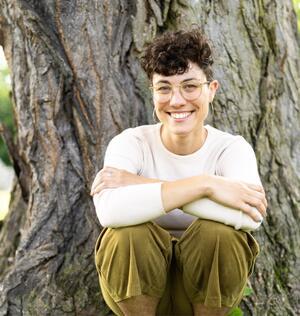7 Questions For Molly Bajgot
JWA chats with Jewish musician, educator, and activist Molly Bajgot. Check her summer and fall tour dates on her website.
JWA: How do you use music to connect to your Jewish identity?
Molly Bajgot: As a young person, I went to an all-girls Jewish sleepaway camp, Camp Pembroke. It was the first place where I fell in love with singing Jewish music and observed a full Shabbat—Friday night through havdalah. Growing up in my mixed-heritage Catholic-Jewish household, my Jewish identity and music became tightly connected to those immersive summer experiences and was carried into college, leading Reform services at UMass Hillel and coordinating davening at Moishe Kavod House in Boston. When I sing Jewish music, I get to dwell in the text and tunes of those who have come before me; when I write Jewish music, I get to immerse myself in creating a Judaism for myself now, and something for those who come next.
JWA: How does your queerness influence your music-making?
MB: I feel like my queerness has supported my music-making in a few big ways. The first is through community—so many of the relationships and friendships I’ve found through queer community have supported me to take my music-making seriously and cheered me on. The second is through challenging the norm—queerness has pushed me to ask myself tough questions, take risks with my heart, and break out of boxes. The experience of swimming upstream and questioning the status quo have become places from which to write and share.
JWA: Can you tell us about your new album of original music, Revelry?
MB: Yes! Revelry is an album of original tunes to Jewish liturgy and secular songs of hope. The collection was written over seven years, and I’m so lucky to have collaborated with an incredible band and team to bring it to life: Anand Nayak (producer, guitarist), Aly Halpert (vocalist), Anat Hochberg (vocalist), Batya Levine (vocalist), Richie Barshay (percussion), Matt Goldfield (piano, mandolin), Reed Sutherland (bassist), Rachel Leader (violin), Samson Oppenheim (clarinet, bass recorder), and Stephen Katz (cello). The tunes included on the album range from celebratory and hopeful to brokenhearted. My intention was to create an album that captured the vast emotional landscapes of our lives, and to affirm that joy is a key ingredient to our collective liberation.
JWA: What is your process of creating music with others like?
MB: In 2017, Aly Halpert, Batya Levine and Anat Hochberg and I met in my home in Northampton, Massachusetts for a retreat to talk about our shared goals and visions as Jewish musicians. We knew that, if we weren’t intentional, our shared dreams of pursuing this work could lead us away from friendship and towards competition. Instead, we committed to being on each other's teams, and we have been ever since. We haven’t written too much music together, but we’ve taken turns backing each other big time—singing on each other’s albums, troubleshooting hard questions, fundraising for each other, and more. It has been a huge practice and allowed us to stay connected to each other as our careers develop, especially as raised-female artists.
JWA: What are your biggest musical influences?
MB: Well, I think I have to start by sharing that my first big musical influence was Dream. This girlband knew how to sing (I feel like they taught me how to sing) and I still know every line to their songs. These days, my biggest musical influences really range from the contemporary Jewish musical scene, current pop music, and the Jewish Soundcloud world—which if you don’t know it, you should dive in!
JWA: You lead prayer services for a variety of Jewish communities. What is your philosophy as a prayer leader?
MB: As a prayer leader, I want people to have a few different experiences in a service space—to sing, to listen, and to feel. When I’m designing a service, I think about which tunes can be anchors for a community: which tunes do they already know and which prayers will feel familiar to them. With that in mind, I plan for moments of listening: moments where the kahal [congregation] is invited into silence, or learning a new tune. I then scaffold on moments to feel: kavanot or moments of guidance to feel into our breath and bodies. I find that each of these access points touch on a different part of our human experience, and creates the most possibility that I’ll reach each person in the room, if only for a moment.
JWA: What do you find most inspiring about the contemporary Jewish music scene?
MB: What I find the most inspiring is how it is finding its way to Jews who lost or never had a connection to their Judaism, and inspiring or reconnecting them to the community, beauty and possibility that is Judaism today. As someone who grew up amongst my dad’s Catholic family, claiming my Judaism through music has meant so much to me and supported me to work through my internalized antisemitism. I’m enthusiastic about the way the contemporary Jewish scene is making that possible on a large scale.







